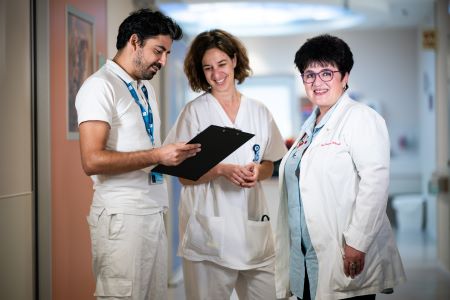
Only three countries in the world—the US, China, and Israel—currently offer CAR (chimeric antigen receptor) T-cell therapy for cancer patients. Thanks to the efforts of Hadassah researchers, treatment in Israel is considerably less expensive than anywhere else.
Offered at Hadassah Hospital Ein Kerem, CAR T-cell therapy is a way to get immune cells called T cells (a type of white blood cell) to fight cancer by changing them in the lab so they can find and destroy cancer cells. Such therapy is also sometimes talked about as a type of cell-based gene therapy because it involves altering the genes inside T cells to help them attack the cancer.
Prof. Polina Stepensky, Director of the Bone Marrow Transplant and Immunotherapy Department, who came to Israel from Ukraine, brought this therapy to Israel. At first, she used the American therapy, subsequently developing her own at much less expense.
It’s already saving lives. Uri Lahav-Goldshmid, 49, a sabra father of three, is an occupational therapist. His mother is the president of Hadassah Israel Modi’in. His grandmother was the president of Hadassah Israel’s Jerusalem Tamar Chapter.
Six years ago, after feeling lethargic and suffering from pain in his bones, he was diagnosed with multiple myeloma, a type of bone-marrow cancer. He had been treated with five different types of medication at Hadassah, but one by one they stopped working.
“I’d read about CAR -T therapy in the United States, but I was beyond thrilled to learn that my own hospital was now offering it,” he says.
He was accepted and admitted for the trial. His own T-cells were extracted, treated to make them deadly and accurate, and then multiplied, and put back into his body to vanquish the cancer cells.
“The first days were rough—actually a good sign—and the staff knew exactly how to treat me.”
He says it wasn’t as hard as chemotherapy or bone-marrow transplantation, both of which he has undergone.
“What Professor Stepensky does is like rocket science,” says mom Elisheva Lahav.
In an ongoing Phase I clinical trial, 85 percent of 20 relapsed or refractory multiple myeloma patients on the treatment responded, and 71 percent had a complete response. The patients had an average of six previous types of treatment that were no longer effective.
Lahav-Goldshmid does not yet have long-term results, but his numbers are up and he’s already feeling better. What’s most encouraging? “It’s that at Hadassah they’re never standing still. Every day they’re working to improve yesterday’s treatment. They’re working on my type of cancer, and then she’s going to go after all the others.”
Photo caption: first on the right – Prof. Polina Stepensky, Director of the Bone Marrow Transplant and Immunotherapy Department with staff members
